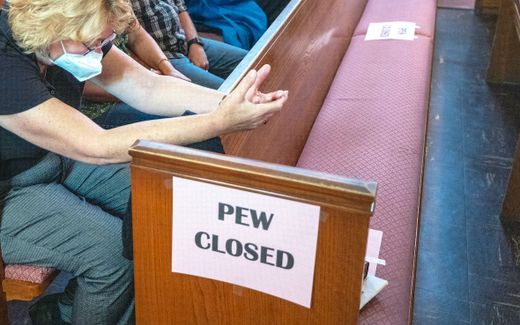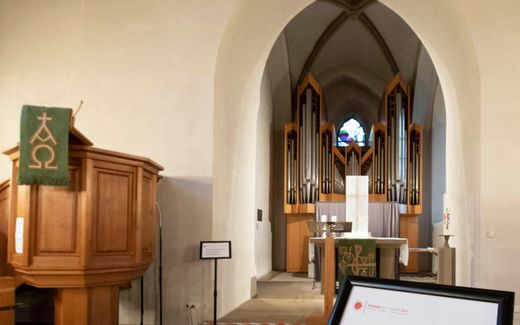After Corona, church attendance should become a habit again
23-10-2021
Christian Life
Dr Bram Kunz, RD

Church has to come back in the right place again. Photo Pexels, Matt Hardy
Christian Life
The church service is the heart of a Christian Sunday celebration. But after Corona, how does it get back into the routine, especially for children and young people? It is time to work on creating habits – a plea for nurturing patterns.
In his book "Godschaamte" ("Shame of God"), columnist Stephan Sanders writes about the importance of developing a routine in church attendance. Although he was raised as a Christian, the habit sank in with him as a teenager; however, he picked it up again in his fifties.
His reflection on this is revealing: "When I confessed to Roman Catholicism again after forty years of church and faith silence and even became a faithful churchgoer after some time, there were many memories that only needed to be activated." Sanders' observation underscores the importance of a custom for Sunday church attendance.
However: Corona abruptly broke the pattern. By now, many young people are accustomed to physically attending church only occasionally. For children, the situation is even more complicated: many six-year-olds have barely been to church. When one considers that habit formation takes time, one realises that the problem regarding churchgoing is not at all rosy for many children and young people.
Task
Now that more is possible on Sundays, educators must realise that they have an essential task to perform in order to form habits. Children and young people must get used to the physical church service again. This task is given with a Christian upbringing. Still, it is even more urgent because of the disruption caused by the corona epidemic: the habit must be restored.

Now the use of words like "routine" and "habit formation" can raise questions. After all, they suggest that it is mainly about establishing a pattern as if people go to church mainly out of habit, without thinking about it. And what is especially questionable: it seems that going to church is the result of pedagogical dressage, just because it is the way it should be. Seen in this way, it is about the power of habit that educators maintain, while inner involvement remains out of the picture.
Appropriation
However, another view of habit formation is also possible. The Bible gives an excellent example of this: According to His custom, Jesus goes to the synagogue on the Sabbath (Luke 4:16). This indicates a pattern: on Sabbath, He goes to the synagogue.
Jesus learned it from Joseph and Mary. He came there as a child, in the synagogue at Nazareth. However, the possessive pronoun shows that Jesus made this pattern His own. It is a matter of appropriation: going to the synagogue has become His habit. Custom in the Biblical sense does not exclude personal involvement but rather presupposes it.
From this perspective, what does it mean to work on habit formation regarding going to church? A characteristic of a habit is a structure through which people do not make a rational decision every time. In this case: why should I go or not go? I will go because that is what I am used to, is then not a strange motivation.
Furthermore, habits show something of what people find essential. Finally, they are not an end in themselves but serve a higher purpose. In the words of the Canadian American philosopher James K. A. Smith, habituation gives direction to desires. In the case of going to church, it is about directing desires toward God.
Reflection
People can adopt a habit, but they can also lose it. Regarding going to church, the latter is even easier than the former. After all, a sinful heart does not attract to God. Obedience to God's commandment never comes from within; we must learn it.
It is, therefore, necessary to reflect on church attendance as a good habit. As primary educators, parents play an important role in this. They take their children by the hand, initially even literally. To get them going, parents must be consistent, especially if they themselves have avoided going to church regularly. It confronts them with the question of whether they go to the church according to their habit or whether personal involvement is lacking. Obedience to the pedagogical task of attending church requires first and foremost conversion and repentance from educators themselves.
In addition to telling examples, children and young people need words that express the value of habits. Indeed, customs are not rational, but that does not mean that they are not based on reasons. In this regard, educators need not point only to their own church attendance, which, after all, is also exposed to the desolation of time. In this respect, Corona blows over much formality.
Practice
Church attendance, however, is an ancient practice, a grown habit into which people may develop. Those who attend church participate in a course in which many have gone before. Educators may show their children that this practice has value in itself. By going to church, sinners learn to love God, to live on grace and to be witnesses of Christ and His Kingdom.
This fact does presuppose that people get moving: out of their own house, into God's house. Going to church requires, above all, a movement of the soul: the focusing of one's desire to God.

However, going to church is, above all, a practice that exists by the grace of the calling God, thanks to the sacrifice of Christ. It gets to the heart of Christian habit formation regarding churchgoing. Habituation is more than a pedagogical ideal that parents set for themselves. Behind the good habit of going to church is God's calling.
It raises Sunday church attendance above the power of customs, above traditionalism because that's the way it should be. Going to church is a hopeful event, despite everything. Those who turn to Christ will find that He hears them. And whoever turns to Him will find peace. Therefore, habit formation is worthwhile for faithful churchgoers and those who have lost the thread, even in our time.
And: hopefully, you will never get used to the fact that God makes Himself known through His Word.
This article was published previously in the Reformatorisch Dagblad on September 25th, 2021.
Related Articles





